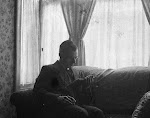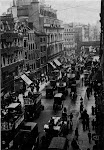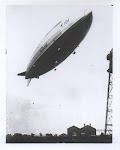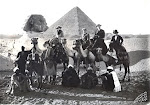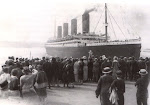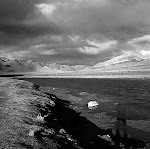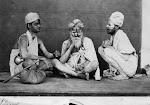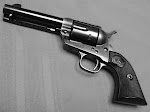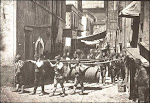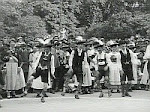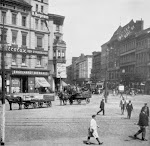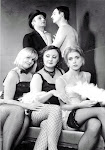(This missive is delivered to Irene a day after she receives an unusual item from Peter: a thin sheet of cardboard out of which several small oblong spaces have been cut. Though puzzled at first, she realizes that it is a makeshift decryption device when she gets the following letter. Placing the cardboard over the page, only the words and letters in red below show through.)
Dear Irene,
I hope this finds you well. I used to look in the mirror and see a young man, but I am not so young anymore! It is true what they say about time flying. Did you get what I sent you? You must be glad to be back in London. As for me, I recently went to the opera and had a wonderful time. The library in Berlin is magnificent! A man can easily get lost in such a place. I was there for several hours before I realized how late it was. Klaus has another guest named Alexandr, and of course his cat Henri. He is as wonderful a host as ever, as I knew he would be. It seems the years have been kinder to him than to me. Alas, youth is truly wasted on the young, Irene, wouldn't you agree?
Strange how a place can be both so familiar and yet so new. But being here is refreshing nonetheless. I have encountered many old friends. Something I have yet to do is go to the thermal spring in Wiesbaden to ease the horrible pain in my bad foot, which came back shortly after I arrived. I am through with these infirmities! I wish they would leave me be. Perhaps when I am more rested. It was especially bothersome when I awoke yesterday, but it got better throughout the day. I suppose it is just part and parcel of getting older, no?
I will write more when I get the chance. Sorry to complain so much! You must think I have become a terrible bore. Don't let me worry you; I am happy just to be alive after all we have been through, and for that much I am grateful. I look forward to hearing from you.
Yours,
Peter
journal: 11 May, 1924
Have arrived safely in Berlin. Bhakti and I will reside with Klaus for the time being. He has another boarder named Alexandr Kunzel, whom I understand was an Olympic athlete many years ago.
Against Irene's wishes and my better judgment I will experiment with the mirror tonight. Bhakti will be on hand should anything go amiss.
Also received a strange note from unknown sender "CB." I am not certain of his (?) meaning or motives, but he seems to know something of me. Will have to be watchful when out in public and take appropriate precautions. No more sticks!

(letter by Colin)
Against Irene's wishes and my better judgment I will experiment with the mirror tonight. Bhakti will be on hand should anything go amiss.
Also received a strange note from unknown sender "CB." I am not certain of his (?) meaning or motives, but he seems to know something of me. Will have to be watchful when out in public and take appropriate precautions. No more sticks!

(letter by Colin)
Psychoanalysis at Das Institut für Sexualwißenschaft (May 1924)
I.
“So,” Dr. Hirschfeld began, “what ails?”
Patient P had much to say; so much to say, in fact, that nothing came out for a long while. “I’m not sure where to start,” he said at last. “So much has happened since we parted ways. Since Lily left me.”
Because you failed to cure me. (He did not say that, of course, but he might as well have, and the doctor wrote it down as if he had.)
“And something has happened since to bring you back here,” Hirschfeld confirmed. “I take it you are still wearing women’s clothes for sexual gratification?”
“That’s not why I’m here,” P said, responding to the question without answering it in full.
The doctor waited motionlessly for his patient to present his problem.
P said, “I think… I may be going mad.”
Hirschfeld held his pencil at the ready and suggested, “Why don’t you start from the beginning?”
II.
“Did you believe this relic was cursed when you sent it to your mother?” Hirschfeld asked. P had been sharing his journal in session.
P shook his head. “No. It was only later, when people associated with the excavation started dying, that I began to wonder. I would not say that I believed in curses. At least,” he added quietly, “I didn’t then.”
“Hm,” the doctor grunted. After a while, he said, “I wonder what it would mean for you if part of you, some small part of you, wanted your parents to die.”
P scoffed at the brazen outrageousness of the analyst’s thinking and folded his arms. “What kind of question is that? Really, doctor! Are you trying to provoke me?”
“Perhaps I am,” the doctor acknowledged. “So humour me. What would it mean for you if you wanted your parents to die?”
P sighed in irritation. “For one, it would mean I am a horrible person! What kind of son would—”
“Read,” Hirschfeld interrupted, pointing to a paragraph in a journal entry his patient had crossed out entirely.
P took his journal and reluctantly read aloud, “I can still remember when I was a boy and buried my father's gold fob watch in the yard. Then I dug it up, and proudly returned it to him, pretending that it was a great treasure. (Seems I am still preoccupied with digging in the dirt!) My, how red in the face he turned! And then he tossed me down the stairs like a sack of potatoes. I dislocated my shoulder, but dared not complain because then he would really get angry. Thank you, Father, for teaching me the value of a stiff upper lip!”
P stopped, his eyes downcast.
“Keep going,” the doctor prompted.
Struggling, the patient continued, “And you, Mum: thank you for not sheltering me from such harsh lessons. Thank you also for letting me be the strong one after Davey died in that slimy hole at Passchendaele. Even as I tended to you, overwhelmed by grief as you were, you asked me, ‘Why did it have to be him, Petey? Why not you?’ Did that ever open my eyes! Yet, I could not but share your wish. How glad it makes me to know that you are both reunited at last!”
The ink began to blur where P’s tears fell onto the page.
“Those sound to me like the words of an angry person,” Hirschfeld said gently, “A person who is hurting, but not a horrible person.”
P’s hands covered his face as his body shook with sobs he could barely contain.
III.
“I would like to point out something,” the doctor said. “This woman, Irene; she features prominently in your journal, but you have never mentioned her in our sessions.”
“Huh,” P grunted. It was true.
Hirschfeld continued, “I mention it only because she seems to have been a central figure in these experiences that troubled you so. I wonder what it means that you have thus far omitted her from our exploration of these events.”
“Perhaps it does not mean anything,” the patient countered.
“Perhaps,” the doctor acknowledged, and then riposted: “But in my experience, that which is not spoken is often more telling than that which is.”
P sighed, “Fine. As you know, we first met on Carter’s dig in Egypt. It was coincidence that brought us together again at Mohenjo-Daro. We were simply colleagues at first, but then circumstances led us to become something like partners against a common threat.”
“Partners?” Hirschfeld inquired, finding it an interestingly detached term to describe what seemed to be a much more personal relationship.
“Friends,” P amended.
“You seem reluctant to acknowledge her importance to you,” the doctor observed.
“I worry for her,” P confessed. “She's far away now, and I’m scared that I might not be able to keep her safe.”
“Does she remind you of anyone else in your life?” Hirschfeld asked.
“She reminds me somewhat of my sister,” P said after some reflection. From his position on the couch, he could not see the doctor raise an eyebrow. “But the better parts of her: the indomitable, adventurous parts; not the exploitative, manipulative parts.”
“You and your sister… had an unconventional relationship,” the doctor recalled.
“Irene and I were nothing like that,” snapped P.
“Did you ever think about—”
“Of course!” P said, reddening a shade. “What man wouldn’t? But I could never approach her on such terms. No, no. She certainly won’t understand, and God knows I never want to have to go through an experience like that again! I put both Lily and myself through hell, and once was quite enough.”
“So you channeled your sexual urges into something more acceptable, noble even, something safer. You became her protector.”
P snorted. “Some protector,” he remarked drily. “And why does everything with you analysts have to be about sex, anyway?”
Hirschfeld retorted, just as drily: “You do realize where you are?”
The doctor’s point, and the humour he used to make it, only galled his patient more. “How many times do I have to say it, Dr. Hirschfeld? I’m not here to talk about that.”
“Right, of course,” the doctor said. “Tell me then, what would the loss of Irene mean to you?”
P sighed, wondering if he had not already lost her. “Well,” he began, “not only would I feel responsible if something were to happen to her, God forbid, but it would mean that I had lost the only other person who shared in these dreadful events, and who accepts what I went through as the honest truth, as terrible as the implications of such a truth are. She too had some experiences there that she did not fully understand and which seemed implausible at the time but yet begged for an explanation. We are linked by tragic circumstances. Frankly, I do not know that I would be able to go on without her.”
Nodding as he listened, Hirchfeld jotted the following in his notepad: Folie à deux.
IV.
“What more can you remember about your experience at the well?” Hirschfeld asked.
“I’ve told you all I can remember,” Patient P insisted. “In truth, I am thankful I cannot recall more.”
The doctor scribbled something in his notepad before declaring, “I think we should try hypnosis.”
“Hypnosis? To help me remember?”
The doctor nodded.
“Why should I want to remember the most horrific experience of my life more clearly?” P balked. “So I can lose even more sleep? What, have our sessions become so boring and repetitive that you need more details to titillate you?”
Hirschfeld did not respond to P’s sudden display of hostility, though it told him that he was pursuing a valuable line of inquiry. “I would not say they are boring,” he clarified, “though I do believe we have reached something of an impasse. You have been very open in sharing with me what you can, but I feel as though I were reading a book in which several pages are left blank.”
“And how would it help me to fill in these pages?” P asked skeptically.
“You are familiar with my mind-as-iceberg analogy,” the doctor said, “so let me make another. This time, I will compare the mind to a closet, in which the psychic energy of negative emotional experiences is packaged into boxes and tucked away from view, kept out of awareness. But just because something is not seen does not mean it is not there. And, just like a closet, the mind can only contain so much; at some point, when it is too full, opening that closet even a little will cause all those boxes to tumble forward and spill out their contents.”
“I see,” P said. “And you think I should unpack these boxes to prevent such a thing from happening.”
The doctor nodded.
“I am not eager to revisit that experience,” P acknowledged, reluctantly adding, “but if you say it will help me, then I see no other choice. I am desperate for relief.”
“Very good,” Hirschfeld said. He rose from his seat to draw the window shades closed and to retrieve a candle from the bookshelf. Lighting it with a match, he placed it on the table in front of the couch upon which P reclined before returning to his own chair. “Now then. Relax. Focus your eyes on the candle. Watch the flame closely, and listen carefully to my voice…”
*****
“Find yourself back in India,” Hirschfeld suggested, “back at the hospital, on that night at the well. Where are you? What do you see?”
“I‘m in the grass,” P said. “It’s dark… Ashan is beside me. I can see the well… There are jackals… many… sitting around it.. watching.”
“What else?” The doctor pressed, having heard this part before.
“There is a light in the well.”
“What kind of light?”
“I.. don’t know… never seen anything like it before.”
“Is it like a firelight? A torch, or lantern?”
“No,” P said. “It’s like a glow… silver.. cold.”
The doctor’s pencil scribbled as the patient talked. “What happens next?”
“The jackals… in a circle. The glow is getting brighter… like nothing I’ve ever seen.” In his trance, P shuddered. “Something is happening… it feels wrong.”
“What gives you that feeling?”
“Don’t know… I’m afraid of what might happen… I mustn’t let it happen. I have to stop it!”
“What is it you do?”
“I pick up a rock and throw.. I see a stick on the ground, grab it… I charge forward. I have to stop it! But it’s no good, they are too quick. I hear a voice…”
“Whose voice?”
“I don’t know… in the well…”
“What is it saying?”
“Rakram… I call out to Ashan to bring stones… Agh!! One of them has me by the wrist!” P’s arm spasmed as his mind recalled the pain of the jackal’s bite and his desperation to shake it loose.
“You’re safe,” Hirschfeld suggested soothingly. “You can feel no pain in this state.” Seeing his patient relax, the doctor asked, “What is happening now?”
“The light is fading… I have to look inside, I have to know… oh, God.. it’s a man’s face! I’ve seen him before… it’s John Daniel! God, those horrible, bulging eyes… please, let me wake up!”
The doctor kept writing and said, “You are fine, the face is gone. Where are you now?”
“I.. I don’t know… a library, I think, but not a library…”
“Tell me everything you see.”
“I’m sitting on a cube… it’s cold, stone… there is a larger block of stone… many scrolls… by God, it’s huge… the shelves could fit a man… so tall, I can’t see the top… there are spires, orbs…” P began to shiver. “It’s cold… hard to breathe…”
“What are you doing?”
“I find a book under the scrolls… some glyph on the cover, strange.. yet familiar… I open it.. the pages are made of some mineral, the symbols… never seen them before, but I can read them… they… syllables… my mind… no words… something.. is happening in my brain.. oh, God, it has me..!”
Hirschfeld leaned forward. “You did not have the words then, but you have them now. Remember and tell me what you see.”
“It’s too much..! Vast… aeons..! Oh, God, I can’t… I can’t.. urk!” Alarmingly, P’s body tensed and writhed, as if in a seizure, and no more words would come.
“Tell me!” The doctor urged, “Speak!”
As if mechanically cranked, P’s jaw opened wide as he struggled to comply. At first, all that came out was a long, hollow croak. This wretched noise grew in volume until, in a shrill, ear-splitting voice that seemed less than human, P emitted the most detestable glossolalia Hirschfeld had ever heard in all his years of working with psychotics: “IA! IA! TH’G-NGH’AAA! MW’G-WGAA! YIG-SHIG’GAAA! T’SOTH-SHOG’GAA! E’YAYAYAYAAAAAAAAAAAAAAAH!”
Suddenly, P sat boldly upright, the terror of reliving his trauma having snapped him out of his trance. Panting, drenched in sweat, he was clearly shaken; but just as one who wakes from a nightmare is gladdened to suddenly find himself in the safety of his bed, P breathed deeply in relief as he recognized the familiar setting of his analyst’s office.
“Well?” He asked, looking to the doctor expectantly, hoping he had provided sufficient detail that there would be no encore to the exercise.
“I think that will be all for today,” Hirschfeld said with practised calm. P did not notice the bead of sweat that trickled down the doctor’s brow, nor the broken pencil point on the floor.
V.
Hirchfeld remarked, “You’ve been very forthcoming in sharing your journal with me and processing your feelings. You have also been courageous in allowing exploration of memories you wanted to forget. But, I must ask, is there anything you would like to tell me? Anything we have not talked about but which you think might be important for me to know?”
I killed a man! The patient’s conscience screamed. I came upon him while he was sleeping, put my gun in his mouth, gagged him and forced him to bind himself, robbed him, killed him in cold blood, and felt nothing!
“No,” P lied, “nothing.”
“So,” Dr. Hirschfeld began, “what ails?”
Patient P had much to say; so much to say, in fact, that nothing came out for a long while. “I’m not sure where to start,” he said at last. “So much has happened since we parted ways. Since Lily left me.”
Because you failed to cure me. (He did not say that, of course, but he might as well have, and the doctor wrote it down as if he had.)
“And something has happened since to bring you back here,” Hirschfeld confirmed. “I take it you are still wearing women’s clothes for sexual gratification?”
“That’s not why I’m here,” P said, responding to the question without answering it in full.
The doctor waited motionlessly for his patient to present his problem.
P said, “I think… I may be going mad.”
Hirschfeld held his pencil at the ready and suggested, “Why don’t you start from the beginning?”
II.
“Did you believe this relic was cursed when you sent it to your mother?” Hirschfeld asked. P had been sharing his journal in session.
P shook his head. “No. It was only later, when people associated with the excavation started dying, that I began to wonder. I would not say that I believed in curses. At least,” he added quietly, “I didn’t then.”
“Hm,” the doctor grunted. After a while, he said, “I wonder what it would mean for you if part of you, some small part of you, wanted your parents to die.”
P scoffed at the brazen outrageousness of the analyst’s thinking and folded his arms. “What kind of question is that? Really, doctor! Are you trying to provoke me?”
“Perhaps I am,” the doctor acknowledged. “So humour me. What would it mean for you if you wanted your parents to die?”
P sighed in irritation. “For one, it would mean I am a horrible person! What kind of son would—”
“Read,” Hirschfeld interrupted, pointing to a paragraph in a journal entry his patient had crossed out entirely.
P took his journal and reluctantly read aloud, “I can still remember when I was a boy and buried my father's gold fob watch in the yard. Then I dug it up, and proudly returned it to him, pretending that it was a great treasure. (Seems I am still preoccupied with digging in the dirt!) My, how red in the face he turned! And then he tossed me down the stairs like a sack of potatoes. I dislocated my shoulder, but dared not complain because then he would really get angry. Thank you, Father, for teaching me the value of a stiff upper lip!”
P stopped, his eyes downcast.
“Keep going,” the doctor prompted.
Struggling, the patient continued, “And you, Mum: thank you for not sheltering me from such harsh lessons. Thank you also for letting me be the strong one after Davey died in that slimy hole at Passchendaele. Even as I tended to you, overwhelmed by grief as you were, you asked me, ‘Why did it have to be him, Petey? Why not you?’ Did that ever open my eyes! Yet, I could not but share your wish. How glad it makes me to know that you are both reunited at last!”
The ink began to blur where P’s tears fell onto the page.
“Those sound to me like the words of an angry person,” Hirschfeld said gently, “A person who is hurting, but not a horrible person.”
P’s hands covered his face as his body shook with sobs he could barely contain.
III.
“I would like to point out something,” the doctor said. “This woman, Irene; she features prominently in your journal, but you have never mentioned her in our sessions.”
“Huh,” P grunted. It was true.
Hirschfeld continued, “I mention it only because she seems to have been a central figure in these experiences that troubled you so. I wonder what it means that you have thus far omitted her from our exploration of these events.”
“Perhaps it does not mean anything,” the patient countered.
“Perhaps,” the doctor acknowledged, and then riposted: “But in my experience, that which is not spoken is often more telling than that which is.”
P sighed, “Fine. As you know, we first met on Carter’s dig in Egypt. It was coincidence that brought us together again at Mohenjo-Daro. We were simply colleagues at first, but then circumstances led us to become something like partners against a common threat.”
“Partners?” Hirschfeld inquired, finding it an interestingly detached term to describe what seemed to be a much more personal relationship.
“Friends,” P amended.
“You seem reluctant to acknowledge her importance to you,” the doctor observed.
“I worry for her,” P confessed. “She's far away now, and I’m scared that I might not be able to keep her safe.”
“Does she remind you of anyone else in your life?” Hirschfeld asked.
“She reminds me somewhat of my sister,” P said after some reflection. From his position on the couch, he could not see the doctor raise an eyebrow. “But the better parts of her: the indomitable, adventurous parts; not the exploitative, manipulative parts.”
“You and your sister… had an unconventional relationship,” the doctor recalled.
“Irene and I were nothing like that,” snapped P.
“Did you ever think about—”
“Of course!” P said, reddening a shade. “What man wouldn’t? But I could never approach her on such terms. No, no. She certainly won’t understand, and God knows I never want to have to go through an experience like that again! I put both Lily and myself through hell, and once was quite enough.”
“So you channeled your sexual urges into something more acceptable, noble even, something safer. You became her protector.”
P snorted. “Some protector,” he remarked drily. “And why does everything with you analysts have to be about sex, anyway?”
Hirschfeld retorted, just as drily: “You do realize where you are?”
The doctor’s point, and the humour he used to make it, only galled his patient more. “How many times do I have to say it, Dr. Hirschfeld? I’m not here to talk about that.”
“Right, of course,” the doctor said. “Tell me then, what would the loss of Irene mean to you?”
P sighed, wondering if he had not already lost her. “Well,” he began, “not only would I feel responsible if something were to happen to her, God forbid, but it would mean that I had lost the only other person who shared in these dreadful events, and who accepts what I went through as the honest truth, as terrible as the implications of such a truth are. She too had some experiences there that she did not fully understand and which seemed implausible at the time but yet begged for an explanation. We are linked by tragic circumstances. Frankly, I do not know that I would be able to go on without her.”
Nodding as he listened, Hirchfeld jotted the following in his notepad: Folie à deux.
IV.
“What more can you remember about your experience at the well?” Hirschfeld asked.
“I’ve told you all I can remember,” Patient P insisted. “In truth, I am thankful I cannot recall more.”
The doctor scribbled something in his notepad before declaring, “I think we should try hypnosis.”
“Hypnosis? To help me remember?”
The doctor nodded.
“Why should I want to remember the most horrific experience of my life more clearly?” P balked. “So I can lose even more sleep? What, have our sessions become so boring and repetitive that you need more details to titillate you?”
Hirschfeld did not respond to P’s sudden display of hostility, though it told him that he was pursuing a valuable line of inquiry. “I would not say they are boring,” he clarified, “though I do believe we have reached something of an impasse. You have been very open in sharing with me what you can, but I feel as though I were reading a book in which several pages are left blank.”
“And how would it help me to fill in these pages?” P asked skeptically.
“You are familiar with my mind-as-iceberg analogy,” the doctor said, “so let me make another. This time, I will compare the mind to a closet, in which the psychic energy of negative emotional experiences is packaged into boxes and tucked away from view, kept out of awareness. But just because something is not seen does not mean it is not there. And, just like a closet, the mind can only contain so much; at some point, when it is too full, opening that closet even a little will cause all those boxes to tumble forward and spill out their contents.”
“I see,” P said. “And you think I should unpack these boxes to prevent such a thing from happening.”
The doctor nodded.
“I am not eager to revisit that experience,” P acknowledged, reluctantly adding, “but if you say it will help me, then I see no other choice. I am desperate for relief.”
“Very good,” Hirschfeld said. He rose from his seat to draw the window shades closed and to retrieve a candle from the bookshelf. Lighting it with a match, he placed it on the table in front of the couch upon which P reclined before returning to his own chair. “Now then. Relax. Focus your eyes on the candle. Watch the flame closely, and listen carefully to my voice…”
*****
“Find yourself back in India,” Hirschfeld suggested, “back at the hospital, on that night at the well. Where are you? What do you see?”
“I‘m in the grass,” P said. “It’s dark… Ashan is beside me. I can see the well… There are jackals… many… sitting around it.. watching.”
“What else?” The doctor pressed, having heard this part before.
“There is a light in the well.”
“What kind of light?”
“I.. don’t know… never seen anything like it before.”
“Is it like a firelight? A torch, or lantern?”
“No,” P said. “It’s like a glow… silver.. cold.”
The doctor’s pencil scribbled as the patient talked. “What happens next?”
“The jackals… in a circle. The glow is getting brighter… like nothing I’ve ever seen.” In his trance, P shuddered. “Something is happening… it feels wrong.”
“What gives you that feeling?”
“Don’t know… I’m afraid of what might happen… I mustn’t let it happen. I have to stop it!”
“What is it you do?”
“I pick up a rock and throw.. I see a stick on the ground, grab it… I charge forward. I have to stop it! But it’s no good, they are too quick. I hear a voice…”
“Whose voice?”
“I don’t know… in the well…”
“What is it saying?”
“Rakram… I call out to Ashan to bring stones… Agh!! One of them has me by the wrist!” P’s arm spasmed as his mind recalled the pain of the jackal’s bite and his desperation to shake it loose.
“You’re safe,” Hirschfeld suggested soothingly. “You can feel no pain in this state.” Seeing his patient relax, the doctor asked, “What is happening now?”
“The light is fading… I have to look inside, I have to know… oh, God.. it’s a man’s face! I’ve seen him before… it’s John Daniel! God, those horrible, bulging eyes… please, let me wake up!”
The doctor kept writing and said, “You are fine, the face is gone. Where are you now?”
“I.. I don’t know… a library, I think, but not a library…”
“Tell me everything you see.”
“I’m sitting on a cube… it’s cold, stone… there is a larger block of stone… many scrolls… by God, it’s huge… the shelves could fit a man… so tall, I can’t see the top… there are spires, orbs…” P began to shiver. “It’s cold… hard to breathe…”
“What are you doing?”
“I find a book under the scrolls… some glyph on the cover, strange.. yet familiar… I open it.. the pages are made of some mineral, the symbols… never seen them before, but I can read them… they… syllables… my mind… no words… something.. is happening in my brain.. oh, God, it has me..!”
Hirschfeld leaned forward. “You did not have the words then, but you have them now. Remember and tell me what you see.”
“It’s too much..! Vast… aeons..! Oh, God, I can’t… I can’t.. urk!” Alarmingly, P’s body tensed and writhed, as if in a seizure, and no more words would come.
“Tell me!” The doctor urged, “Speak!”
As if mechanically cranked, P’s jaw opened wide as he struggled to comply. At first, all that came out was a long, hollow croak. This wretched noise grew in volume until, in a shrill, ear-splitting voice that seemed less than human, P emitted the most detestable glossolalia Hirschfeld had ever heard in all his years of working with psychotics: “IA! IA! TH’G-NGH’AAA! MW’G-WGAA! YIG-SHIG’GAAA! T’SOTH-SHOG’GAA! E’YAYAYAYAAAAAAAAAAAAAAAH!”
Suddenly, P sat boldly upright, the terror of reliving his trauma having snapped him out of his trance. Panting, drenched in sweat, he was clearly shaken; but just as one who wakes from a nightmare is gladdened to suddenly find himself in the safety of his bed, P breathed deeply in relief as he recognized the familiar setting of his analyst’s office.
“Well?” He asked, looking to the doctor expectantly, hoping he had provided sufficient detail that there would be no encore to the exercise.
“I think that will be all for today,” Hirschfeld said with practised calm. P did not notice the bead of sweat that trickled down the doctor’s brow, nor the broken pencil point on the floor.
V.
Hirchfeld remarked, “You’ve been very forthcoming in sharing your journal with me and processing your feelings. You have also been courageous in allowing exploration of memories you wanted to forget. But, I must ask, is there anything you would like to tell me? Anything we have not talked about but which you think might be important for me to know?”
I killed a man! The patient’s conscience screamed. I came upon him while he was sleeping, put my gun in his mouth, gagged him and forced him to bind himself, robbed him, killed him in cold blood, and felt nothing!
“No,” P lied, “nothing.”
journal: 4 May 1924
 At last, now that I have left behind that desolated land of jackals and blood, I can rest. I am, gratefully, not much the worse for wear, and under Bhakti's faithful ministrations, the wounds I still carry are healing well and cause me very little grief. Irene and I departed Karachi on April 27th, bidding a final farewell to Mukherjee (who proved himself a good man in the end) and the sea, and thereupon traveled through Tehran and Ankara by train. We presently find ourselves in Constantinople, that great and ancient metropolis situated between the Dardanelles and the Bosporus.
At last, now that I have left behind that desolated land of jackals and blood, I can rest. I am, gratefully, not much the worse for wear, and under Bhakti's faithful ministrations, the wounds I still carry are healing well and cause me very little grief. Irene and I departed Karachi on April 27th, bidding a final farewell to Mukherjee (who proved himself a good man in the end) and the sea, and thereupon traveled through Tehran and Ankara by train. We presently find ourselves in Constantinople, that great and ancient metropolis situated between the Dardanelles and the Bosporus. Before indulging myself in a Turkish bath, I wired ahead to Klaus to apprise him that I would soon be returning to Berlin and to humbly ask if I might impose upon him to share his living space for the extent of my visit. I am eager to see him again, for, although he certainly has his share of oddities, he is at his heart one of the most hospitable and engaging souls I have yet encountered on this earth. I am sure Irene would find him (or her, depending on the mood) most charming, as he shares her love for knowledge, fashion, and adventure; and though he is blessed with many talents, he has never struck me as haughty or pretentious.
Before indulging myself in a Turkish bath, I wired ahead to Klaus to apprise him that I would soon be returning to Berlin and to humbly ask if I might impose upon him to share his living space for the extent of my visit. I am eager to see him again, for, although he certainly has his share of oddities, he is at his heart one of the most hospitable and engaging souls I have yet encountered on this earth. I am sure Irene would find him (or her, depending on the mood) most charming, as he shares her love for knowledge, fashion, and adventure; and though he is blessed with many talents, he has never struck me as haughty or pretentious. Very soon, Irene and I shall find ourselves on the Orient Express, which will conduct us from Constantinople westward through Bucharest, Budapest, Vienna, and finally Munich before I disembark and take another train north to Berlin. It has been years since I have visited these cities, and some of them I will be seeing for the first time. I trust it will be a refreshing change to shed the role of harried scholar for that of a simple tourist, and to trade camp rations and hospital food for cuisines prepared by true masters of the craft.
Very soon, Irene and I shall find ourselves on the Orient Express, which will conduct us from Constantinople westward through Bucharest, Budapest, Vienna, and finally Munich before I disembark and take another train north to Berlin. It has been years since I have visited these cities, and some of them I will be seeing for the first time. I trust it will be a refreshing change to shed the role of harried scholar for that of a simple tourist, and to trade camp rations and hospital food for cuisines prepared by true masters of the craft.I do not know Irene's plans for herself; although we have briefly discussed having the Pashupati amulet examined by various university experts, I have not yet told her of the mirror or how I managed to acquire it. I am reluctant to do so, though I know I must, for it would be grossly unfair of me to keep such a find from her. I simply do not know what her reaction will be; while I do not believe that she would betray me to the authorities, I am much less certain whether her favorable opinion of me will withstand the revelation. It is this one concern of mine, and only this, that has kept me from sharing the truth thus far, and I find myself postponing the inevitable, hoping for an opportune moment wherein all might be revealed with the least probability of damage.
Though I have emerged out from under the shadow of Mohenjo-Daro, I still find myself casting wary glances over my shoulder. I am especially loath to let my baggage from my sight for any length of time, and though no customs officials have given me any trouble as of yet, I am anxious at every border crossing. I have taken the precaution of secreting the mirror on my person whenever it seems prudent; and though it is made of an unnaturally light mineral, I find that it seems to weigh rather heavily on me, as though I am carrying an immense spiritual burden that has been accumulating since the beginning of time.
journal: 25 Apr 1924
Irene, bless her, came as requested yesterday and, with the assistance of her books, we embarked together on an attempt to make sense of the assorted clues we had gathered, considering them afresh in light of what Ashan had shared with me. We pieced together the puzzle of the powder that had incapacitated Mohan (the antidote to which Ashan later furnished; note: REMIND IRENE TO GET THIS FROM HIM), as well as the meaning of the yantra tattooed on the body of Mumble’s dead companion. We deduced that the cult worshipped a goddess (goddesses?) of transformation/misfortune/destruction, and that there must be an informant somewhere among the ranks McCormick’s men who had provided them with news of our discoveries and whereabouts.
That night, Ashan came unannounced to warn us of jackals. They were gathered around the well outside, he said, and involved in something of a mystical nature. I thought perhaps I had misunderstood his metaphor, only to discover upon investigation that he was speaking quite literally; for the well was aglow with some eldritch illumination, and the voice emanating from it was certainly commanding the verminous creatures encircling it. I am not sure why, but I was seized with the sudden, irresistible urge to bring a halt to this devilry, and I charged at the jackals clad in nothing but my pyjamas, with only an ineffective stick to combat them. It did not go well for me, for the speaker in the well ordered the pack to attack, and for my efforts I received a nasty bite to the wrist. Moreover, my abdominal wound came open in the struggle, though Dr. Ayub has once again put me back together, and allowed me to write this hurried entry.
Yet the greatest wound I received was not physical, but psychical, for I beheld there in the well the awful countenance of a man! His wide eyes bulged from the water most horribly, and though he seemed vaguely familiar to me for some reason, I still cannot place the face. The sight of it shook me greatly, for all at once my logical understanding of the world and my predicament came apart as I realized that the cult was able to wield genuine magic. Magic! What hope had I of understanding such forces, let alone overcoming them? My foolishness at attacking the jackals was overshadowed by feelings of profound insignificance; I was not only powerless, I realized, but utterly helpless. Ashan, if I remember, saw the face as well, and with a roar he dropped an armful of stones into the water, dispelling the sorcerer's image.
My traumatized mind went elsewhere, and I found myself adrift in some nightmare or vision of a cavernous library, its grotesque geometry quite unlike anything on this earth, supported by towering basalt spires and illuminated by strange, phosphorescent spheres of some gelatinous material. There was a book of some kind before me, and against my better judgment I attempted to read the alien characters on its mica leaves, and soon had no say in the matter of reading at all as all my senses were suddenly assailed by aeons of terrible, hellish knowledge, which seemed of its own volition to flood my brain beyond bursting. I lack language to describe what I experienced; the word that comes closest would be rape, perhaps, but even that cannot adequately convey the extent of the violation I felt and the sickness that I fear now festers in my soul. I know only that I must retreat from it as far and as fast as I am capable.
And that is precisely why I must leave this place. I feel suddenly fragile, too small to tangle with death cults and demons and whatever other horrors that have yet to reveal themselves. I have resolved to return to Berlin, where I hope that Dr. Hirschfeld can help me to find some measure of understanding, acceptance, and peace. I will travel forthwith to Constantinople, taking the Orient Express the rest of the way. Due to my injuries, I will have to bring one of the nurses with me.
I hope Irene will understand. I do fear for her, and pray that she quickly follows my example and escapes this accursed land before her health or sanity become as compromised as mine.
That night, Ashan came unannounced to warn us of jackals. They were gathered around the well outside, he said, and involved in something of a mystical nature. I thought perhaps I had misunderstood his metaphor, only to discover upon investigation that he was speaking quite literally; for the well was aglow with some eldritch illumination, and the voice emanating from it was certainly commanding the verminous creatures encircling it. I am not sure why, but I was seized with the sudden, irresistible urge to bring a halt to this devilry, and I charged at the jackals clad in nothing but my pyjamas, with only an ineffective stick to combat them. It did not go well for me, for the speaker in the well ordered the pack to attack, and for my efforts I received a nasty bite to the wrist. Moreover, my abdominal wound came open in the struggle, though Dr. Ayub has once again put me back together, and allowed me to write this hurried entry.
Yet the greatest wound I received was not physical, but psychical, for I beheld there in the well the awful countenance of a man! His wide eyes bulged from the water most horribly, and though he seemed vaguely familiar to me for some reason, I still cannot place the face. The sight of it shook me greatly, for all at once my logical understanding of the world and my predicament came apart as I realized that the cult was able to wield genuine magic. Magic! What hope had I of understanding such forces, let alone overcoming them? My foolishness at attacking the jackals was overshadowed by feelings of profound insignificance; I was not only powerless, I realized, but utterly helpless. Ashan, if I remember, saw the face as well, and with a roar he dropped an armful of stones into the water, dispelling the sorcerer's image.
My traumatized mind went elsewhere, and I found myself adrift in some nightmare or vision of a cavernous library, its grotesque geometry quite unlike anything on this earth, supported by towering basalt spires and illuminated by strange, phosphorescent spheres of some gelatinous material. There was a book of some kind before me, and against my better judgment I attempted to read the alien characters on its mica leaves, and soon had no say in the matter of reading at all as all my senses were suddenly assailed by aeons of terrible, hellish knowledge, which seemed of its own volition to flood my brain beyond bursting. I lack language to describe what I experienced; the word that comes closest would be rape, perhaps, but even that cannot adequately convey the extent of the violation I felt and the sickness that I fear now festers in my soul. I know only that I must retreat from it as far and as fast as I am capable.
And that is precisely why I must leave this place. I feel suddenly fragile, too small to tangle with death cults and demons and whatever other horrors that have yet to reveal themselves. I have resolved to return to Berlin, where I hope that Dr. Hirschfeld can help me to find some measure of understanding, acceptance, and peace. I will travel forthwith to Constantinople, taking the Orient Express the rest of the way. Due to my injuries, I will have to bring one of the nurses with me.
I hope Irene will understand. I do fear for her, and pray that she quickly follows my example and escapes this accursed land before her health or sanity become as compromised as mine.
journal: 23 Apr 1924
The narcotics, in conjunction with the attempt on my life and other strange happenings in recent days, are evoking some unusually vivid dreams. I must commit this one to paper before the image fades:
I was a hunter (hero?) on a quest or pilgrimage of some kind. I felt as though my entire life were culminating at this particular place and time. I think I was in some manner of temple, or some other place of ceremony.
There was chanting all around me in an unfamiliar language. I was chanting, too. (The syllables continue to echo faintly in my mind, but not with sufficient clarity for me to transpose them here.)
There was a woman there as well. Her beauty was incomparable, yet flawed, perhaps unnaturally so? She was special and revered by the crowd, but there was a doom about her. Was she to be wedded to me? Or sacrificed?
Alas, the trace is gone, and I can remember no more.
What might it mean?
23 Apr 1924
Irene,
I hope you are well, or at least in better shape than I! Please see me at the hospital in Ihsaan-Waahaan at your earliest convenience, as I have not yet been given clearance by Dr. Ayub to return to work, and there are matters I would discuss with you that cannot wait that long.
Also, I am very terribly bored, and a visitor might improve my spirits considerably. May pity for me hasten your coming if curiosity alone will not.
Yours,
Peter
P.S. If possible, please bring with you any texts that you may have available pertaining to Sanskrit characters and syllables (especially their more esoteric, occult aspects) as well as the symbolism of yantras.
P.P.S. And cigarettes too, if you please.
journal: 23 Apr 1924
To my dismay, I find myself again visiting the hospital in Ihsaan Waahaan, where I am presently convalescing from a belly wound inflicted upon me by a thief who stole into our camp last night. Fortunately, my caretakers expect me to make a full recovery (your "curse" has not claimed me yet, Tut!), though I anticipate that I shall have a rather impressive scar to memorialize the occasion.
The trouble seemed to begin with the jackals, whose incessant noncturnal wailing left me both sleepless and furious. Desperate for peace, I thought the sound of my pistol would scatter them, and made ready to put my plan into action; but then there came a crash in the direction of the antiquities tent, and I (foolishly, in retrospect) hurried over to investigate.
Irene and McCormick must also have heard the disturbance, for they rushed to the scene as well. We discovered that Mohan, the guard posted outside the tent, was as stiff and unresponsive as a statue, and he remained in this peculiar state throughout the evening. (I will have to get his doctor's thoughts on this once I am well enough to leave my bed, as every movement is agonizing.)
In the chaos that ensued, McCormick shot and killed an intruder. To ascertain that the coast was clear, one of his soldiers went into the tent, were whereupon he was attacked by a second thief who lay waiting in the shadows. Unaware of his presence, I ran over to pull the man to safety, only to be attacked in turn. The thug got past me and menaced Irene, who stood between him and his freedom; so, with little recourse available to me, I struck him on the back of the head with the blunt end of a rifle.
Though I had not intended to injure him severely, I suppose in the excitement of the moment I swung too hard; indeed, I think I might have actually caved in his skull - I swear the weapon got stuck! - yet even this was not enough to subdue him, as he whirled around and slashed me with his knife. Thankfully, Irene was not hurt, and was able to trip him; he fell face-first to the ground and was knocked out cold. (A brave lass, that one.)
Mukherjee, one of McCormick's men, was kind enough to tell me what happened after I lost consciousness in the medical tent. It seems my attacker (to whom I shall henceforth refer as Mumbles), in addition to suffering a severe brain injury, nearly severed his tongue and lost a number of teeth when he fell. I doubt he will be in any shape to tell us much of anything, should he awaken, which is unfortunate but admittedly gratifying.
Per Mukherjee, the thief that McCormick killed had an advanced case of syphilis, resulting in a rather grotesque deformity to his manhood. I am also told that his skin was tattooed with many strange yantras, which may or may not be of any significance. If they have not already disposed of the body, I would like to take a look for myself and perhaps copy them into my notes.
Many mysteries remain: Who were these burglars, and from where did they come? What was it they sought with such murderous intensity? To my knowledge, we had not yet discovered anything of any substantial value; so I wonder, what else might have motivated their thievery, if not monetary gain? Might the artifacts be of some particular spiritual import for some sect or clan? If this is the case, should we expect more intruders?
Alas, these questions will have to wait; for now, my dressing needs changing and I desire morphine, so good Kiran has gone to fetch the doctor.
DO NOT FORGET
1. Speak with Mohan for his recollection of last night.
2. Ask Mohan's physician as to what might have induced total but temporary paralysis (i.e., local toxins, hypnosis, etc.).
3. Check with the doctors as to the severity of Mumbles' wounds and his prognosis. (Also, how was he able to function with the butt of a rifle embedded in his cranium?)
4. Examine the tattooed thief's corpse.
journal: 22 Apr 1924
Insufferably hot. No rain, but the Indus has flooded thrice since March. Very slow going, with little to show for it aside from a score of bricks (all uniform in dimension) and various earthen amulets fashioned to resemble animals (mostly bulls and rhinoceri). Likely pre-Bronze Age, prior to Aryan invasion.



Also found amulet of horned man/priest. J. Daniel perceives connection to Hindoo god Rudra (primordial Shiva). He says the name can be translated as "roarer," "howler," and "terrible." Collective plural (the Rudras) refers to storm gods; associated with archers/lightning. Also believed to cause and cure diseases. 18 inauspicious omens (e.g., famine) when Rudra was born, per legend.
But Mjr. McCormick is of a different mind than Daniel, believing the amulet to signify a "Lord of Beasts," whom he erroneously identified as Pushpati. Irene and I gently corrected him; I noted that Pushpati is a woman's name (indeed, the same as one of my nurses from last summer!), while Irene remarked that the inscription on the amulet reads Pashupati. Naturally, he responded with disdain.

In fairness, the Major's assumption as to the significance of the figure is not without merit, as he is depicted surrounded by various animals - very much like the antlered god from the Gundestrup cauldron, even in posture. But when this resemblance was pointed out to him, he quickly dismissed the observation (for no other reason, it seemed, than it was not his own).
For all the Major's effectiveness as an overseer, barking orders to dig here and there, his aptitude as an archaeologist leaves much to be desired, and his ignorance is compounded by an incurious, autocratic demeanour that at times borders on disrespectful. He reminds me of my father in many ways, down to the loathsome caterpillar on his upper lip that passes for a moustache, and the similarities are beginning to gall me.
Otherwise, nothing of much import has yet been found. As unlikely as it is that we will uncover anything approaching the rich splendour of KV62, we have only begun to dig, and I maintain hope that something of value will be revealed that will make all my labor and suffering worthwhile.
(Also, once again out of cigarettes.)
journal: 28 Mar 1924
(OOC note: the following entry is scratched out in its entirety; weird Blogger formatting won't let me strike this text without also striking every entry that follows)
Deathly ill again, but this time it is my own doing - too much thara and toddy last night. Exhausted and sore from retching. Only now realizing the date, wondering if I attempted to poison myself out of some unconscious urge for punishment. Though I scoff at the notion of curses, I cannot seem to escape from out this lingering umbra of guilt, as though my actions were somehow responsible for the conflagration.
Deathly ill again, but this time it is my own doing - too much thara and toddy last night. Exhausted and sore from retching. Only now realizing the date, wondering if I attempted to poison myself out of some unconscious urge for punishment. Though I scoff at the notion of curses, I cannot seem to escape from out this lingering umbra of guilt, as though my actions were somehow responsible for the conflagration.
Blaming myself has become reflexive. Where family is concerned, I suppose shame is simply woven into my character - an inescapable destiny of disappointment. I was not even able to make it back to London in time for the funeral; and if I am honest with myself (hangovers are the best vehicle for dark, uncompromised introspection) I must admit that I did not truly try.
Sometimes I imagine myself standing before the distinguished crowd the funeral doubtlessly attracted, and I fantasize about the kind of eulogy I might have delivered. And here, amidst the stifling heat of the Sindh and swarms of flies and the hammering in my head, as I look at the trunk containing my pistol and wonder, is it worth it? perhaps I can finally purge the venom in my heart by exorcising these unkind thoughts onto paper:
In Memoriam
I can still remember when I was a boy and buried my father's gold fob watch in the yard. Then I dug it up, and proudly returned it to him, pretending that it was a great treasure. (Seems I am still preoccupied with digging in the dirt!) My, how red in the face he turned! And then he tossed me down the stairs like a sack of potatoes. I dislocated my shoulder, but dared not complain because then he would really get angry. Thank you, Father, for teaching me the value of a stiff upper lip!
And you, Mum: thank you for not sheltering me from such harsh lessons. Thank you also for letting me be the strong one after Davey died in that slimy hole at Passchendaele. Even as I tended to you, overwhelmed by grief as you were, you asked me, "Why did it have to be him, Petey? Why not you?" Did that ever open my eyes! Yet, I could not but share your wish. How glad it makes me to know that you are both reunited at last!
And though she is with us still, I must of course give thanks to my big sister for arranging such a lovely memorial, and for lavishing affection on me during our family's less happy times. Can you remember, Becca, the childhood games we used to play when we were alone? Hide-and-go-seek? Dress-up? They left quite an impression on me, and I will always treas
journal: 6 Mar 1924
What a small world we inhabit! Was exploring Lahore when I ran into Irene Howell, Carter's one-time fiancee. She was as gregarious as I remember, though I was dismayed to see that she has adopted the rather unflattering, masculine habit of wearing pants. She will be joining the excavation here. Not sure how the Major will respond to having a woman on site, but I will do what I can to assuage any misgivings he may have. (On second thought, perhaps wearing pants will work to her advantage!) Attempted to enlist her aid in acquiring some feminine attire for a "lady-friend," but this only invited her to pry.
journal: 5 Nov 1923
Aubrey Herbert, Fourth Earl of Carnarvon, has died. Has the "Pharaoh's Curse" claimed another life? The press seems to think so, but I believe bad medical advice is the more likely culprit - I hear the poor fellow had all his teeth removed when he was told it would restore his sight, which precipitated acute blood poisoning. Still, how unfortunate that such a prestigious lineage should lose two great men in the span of five months!
Subscribe to:
Comments (Atom)
